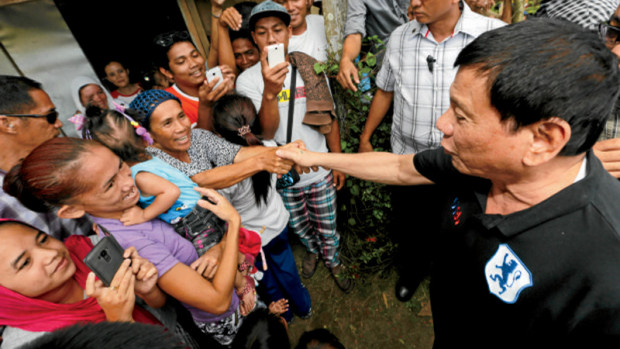High trust rating elates Palace

BASILAN VISITOR President Duterte meets villagers while on hisway to distribute farm equipment to members of Lamitan Agrarian Reform Beneficiaries Cooperative in Lamitan City in Basilan province on Monday. —MALACAÑANG PHOTO
The “excellent” net trust rating of President Duterte in the latest survey by Social Weather Stations (SWS) validated the people’s overwhelming support for his policy of change in government, Presidential Communications Secretary Martin Andanar said on Tuesday.
But Albay Rep. Edcel Lagman said the trust that the majority of adult Filipinos gave the President was “principally limited to his antidrug campaign.”
Several days before Mr. Duterte’s first 100 days in office, 83 percent of respondents had “much trust” in the President despite his scathing pronouncements against critics of his bloody war on drugs, including US President Barack Obama and the United Nations, a polling group has found. Eight percent had “little trust” and 9 percent expressed indecision.
The nationwide survey that SWS conducted on Sept. 24-27 covered 1,200 respondents.
The noncommissioned poll, results of which were first published in BusinessWorld, had a margin of error of plus-or-minus 3 percentage points.
Article continues after this advertisementREAD: Duterte maintains ‘excellent’ trust rating in first 3 months
SWS said Mr. Duterte earned an “excellent” +76 net trust rating (much trust minus little trust), slightly lower than his +79 (84 percent much trust minus 5 percent little trust) net score before he took office in June.
Article continues after this advertisementAndanar said the excellent trust ratings of the President would further motivate his administration to continue fighting illegal drugs and crime, combating terrorism, curbing corruption and sustaining the momentum of economic growth.
“The Duterte administration is committed to good governance anchored on the twin principles of transparency and accountability that will lead to lasting peace, political stability and inclusive economic progress in the years ahead,” Andanar added.
At the House of Representatives, Lagman said Mr. Duterte’s “overall performance with respect to other specific issues was not covered by the latest survey.”
The independent minority congressman noted that SWS survey did not ask questions about specific issues.
Outbursts, tirades
“No questions were asked on the effects on the nation and the economy of Mr. Duterte’s erratic outbursts and provocative tirades; [the government’s] failure to ease the traffic gridlock; and the snail-paced implementation of the President’s socioeconomic agenda,” Lagman said.
“While the President’s deadly campaign against the drug menace is still highly popular, such degree of popular acceptance is diminished by the 71 percent clamor that suspects be arrested alive—a clear rebuke of the unabated extrajudicial killings of drug dealers and users,” he said.
But one of Mr. Duterte’s key allies in the House, Davao City Rep. Karlo Alexei Nograles, said the SWS survey was on affirmation of the people’s support for the President’s leadership as well as his programs and policies.
“It reinforces our belief that indeed, change has come,” said Nograles, chair of the House appropriations committee.
“In less than four months, President Duterte has achieved unparalleled success in responding to our clamor and aspirations that fell in deaf ears during the past dispensation,” he said.
Stern approach
Several senators attributed the President’s popularity to his stern approach to antidrug war.
“Filipinos perceive him as a man of action who produces results, particularly in defeating the scourge of illegal drugs, which I think has hit the core of fear among ordinary families for many years. It is more than enough for him to maintain his impressively high trust rating,” Sen. Panfilo Lacson said in a text message.
Sen. Juan Edgardo Angara has yet to see the survey results but shared what he thought about the results: “[P]erhaps many people feel safer with the administration push to emphasize peace and order.”
Sen. Juan Miguel Zubiri credited Mr. Duterte’s still high rating to his “no-nonsense approach against criminality and drug.”
Zubiri said the people could see how Mr. Duterte had started to fulfill his campaign promises. —INQUIRER RESEARCH WITH REPORTS FROM DJ YAP, GIL C. CABACUNGAN AND TARRA QUISMUNDO